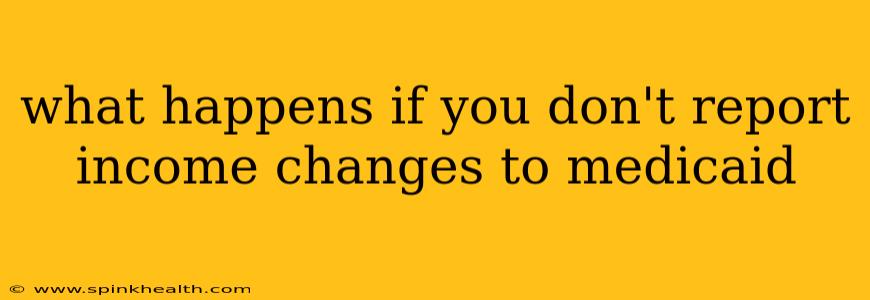What Happens If You Don't Report Income Changes to Medicaid?
The quiet hum of the refrigerator, the gentle ticking of the clock – these are the sounds of home, a home made possible, in part, by Medicaid. But what happens when the comfortable rhythm of life is disrupted by a change? What if your income increases, or, conversely, decreases significantly? Failing to report these changes to Medicaid can have serious consequences, far beyond a simple administrative inconvenience. This isn't just about paperwork; it's about maintaining your eligibility for crucial healthcare services and avoiding potentially damaging legal repercussions.
Let's delve into the potential ramifications, exploring the scenarios and the crucial steps you need to take to ensure you remain compliant.
What are the potential consequences of not reporting income changes to Medicaid?
This seemingly straightforward question has a multifaceted answer. The consequences can range from the relatively minor to the severely impactful, depending on several factors, including the magnitude of the income change and your state's specific regulations.
-
Loss of Medicaid Coverage: This is the most immediate and significant consequence. If your income increases above the Medicaid eligibility limits, and you fail to report it, your coverage can be terminated. This means you suddenly lose access to vital healthcare services – doctor visits, prescription medications, hospital care – leaving you potentially vulnerable to significant medical debt and health complications.
-
Retroactive Payment Demands: Medicaid agencies regularly conduct reviews of recipient income. If an audit reveals unreported income changes, you may be required to repay benefits you received while ineligible. These retroactive payments can be substantial, depending on the duration of the discrepancy. This could create a significant financial burden, potentially impacting your ability to maintain housing or meet other basic needs.
-
Penalties and Legal Action: In some states, failing to report income changes to Medicaid can lead to penalties, fines, and even legal action. These penalties can vary widely, and severe cases can even result in criminal charges.
-
Impact on future eligibility: A history of failing to report income changes accurately can negatively impact your future Medicaid applications. The agency may view you as a high-risk applicant, leading to increased scrutiny and potentially delayed or denied applications in the future.
What if my income decreases? Should I still report it?
Yes, absolutely! Reporting a decrease in income is just as crucial as reporting an increase. Failing to do so could mean you're missing out on benefits you're entitled to. A reduced income might make you eligible for additional support programs or a higher level of Medicaid benefits that you wouldn't otherwise receive.
How often should I report income changes to Medicaid?
This depends on your state's specific regulations. Some states require reporting within a specific timeframe (e.g., within 10 days) of any income change, while others may have less stringent reporting requirements. It is crucial to check with your state's Medicaid agency to understand your specific reporting obligations.
How do I report income changes to Medicaid?
The reporting process varies by state. Usually, there are several methods available. You can contact your caseworker directly, use an online portal, or submit a written notification. You can find the most reliable and up-to-date instructions on your state's Medicaid website.
Maintaining open communication with your state's Medicaid agency is vital. Transparency and prompt reporting prevent serious issues down the line.
Remember, honesty and proactive communication are key to maintaining your Medicaid eligibility. Failing to report changes puts both your healthcare and your financial stability at risk. Don't hesitate to contact your caseworker or your state's Medicaid agency if you have any questions or concerns about reporting income changes.

